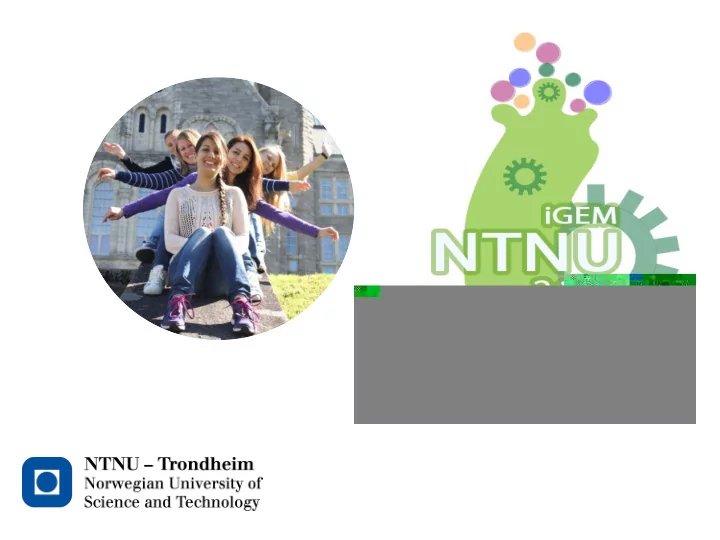

Team: The Students Maria K. Shiva Ingrid Fadum Ellen Stormo Patricia Adl Andersen Moghaddam Kjønstad • Biotechnology/ • Molecular • Biotechnology • Medical • Biochemistry/ Molecular medicine technology/ Molecular • Master student medicine Biophysics medicine • Master student • Master student • Master student • Master student
VesiColi
Outer Membrane Vesicles – OMVs Nanosized Quorum sensing Pathogenesis Transport of proteins Development of biofilm Figure: Gold labeled vesicles from enterogenic E.coli that binds and internalizes in HT29 cancer cells [2] Why not engineer OMVs to be drug delivery vehicles? Kulp, A. and M. J. Kuehn (2010). "Biological functions and biogenesis of secreted bacterial outer membrane vesicles." Annu Rev Microbiol 64 : 163-184 ,[2] Kesty, N. C., K. M. Mason, et al. (2004). "Enterotoxigenic Escherichia coli vesicles target toxin delivery into mammalian cells." EMBO J 23 (23): 4538-4549
Overview • Introduce fluorescent proteins into OMVs • Make OMVs stable in the blood stream • Regulate what enters the vesicles
How to direct proteins into the vesicles? Twin-Arginine Signal Pathway Tat signal peptide
Tat signal sequence Will direct the protein product to the periplasm Our construct in Coding sequence a plasmid
Transport through the Tat transport pathway Budding off!
Vesicle Isolation Sample pellet Analyze vesicle sample
What to put in the vesicles? BioBrick: BBa_K1082001 Thomas, J. D., R. A. Daniel, et al. (2001). "Export of active green fluorescent protein to the periplasm by the twin-arginine translocase (Tat) pathway in Escherichia coli. " Molecular Microbiology 39 (1): 47-53.
Challenges in using OMVs as drug delivery vehicles Contain a drug Targeting specific cells Stable in the blood stream
Protein G • Streptococcal species • Transmembrane surface protein • Binds human serum albumin (HSA) • Can’t be a BioBrick due to restriction sites Masking the vesicles from the immunesystem is crucial for their stability in the body as a drug carrier Egesten, A., I. M. Frick, et al. (2011). "Binding of albumin promotes bacterial survival at the epithelial surface." J Biol Chem 286 (4): 2469-2476
The Pm/Xyls promoter system Regulation of our vesicle system Protein G GFP-RFP Removed a XbaI restriction site to make it a biobrick (BBa_K1082002) "The Pm/xylS expression system." Retrieved 4.10.2013, from http://www.vectronbiosolutions.com/info.php?id=13.
Results: FP dimers We succesfully made a tat-GFP-RFP • EITHER gene construct Sequence confirmed! • Red fluorescence, but no green • fluorescence No detectable quantity in OMVs • OR
Results: Protein G tat-Protein G is We succesfully made a expressed in E.coli tat-Protein G construct No detectable quantity in OMVs Inconclusive
The Pm/Xyls promoter system GFP fluorescence
Novel Approach: Engineered OMVs as drug velivery vehicles • It is hard to make drug delivery vehicles synthetically • Nanosized • Safe (can’t replicate) • Naturally attack eukaryotic cells • Has never been done before!
Human Practices Researchers Night • 1100 High School students Schrödingers Katt • TV-program about Science • Aired in january
BioBricks BioBrick Type Description Length (bp) Part:BBa_K1082001 Coding Tat_GFP_RFP 1711 Part:BBa_K1082002 Regulatory Pm/Xyls promotor system 1760
Thank You Advisors! Rahmi Lale Eivind Almaas Professor, Systems Postdoc, Biology Molecular biology Martin Hohmann- Gunvor Røkke Marriott Phd Student, Associate Professor, Molecular biology Molcular Biology
Thank you for your time We had fun!
Linker sequence • Repetitive sequence: (GGSGGS) 1-9 • Fusion of protein domains via flexible peptide linkers - design proteins with new functions. • peptide linker spatially separates the two proteins - functioning and folding of protein domains. Evers, T. H., E. M. van Dongen, et al. (2006). "Quantitative understanding of the energy transfer between fluorescent proteins connected via flexible peptide linkers." Biochemistry 45(44): 13183-13192.
SDS-PAGE of OMVs from E.coli transformed with the tat_GFP_RFP construct
Red Fluorescence
Excitation scan of OMVs Tat_GFP_RFP construct Wild type
Recommend
More recommend